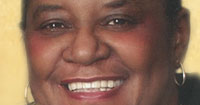When Black students at the University of Minnesota sat down to negotiate with President Malcolm Moos in 1969 after they effectively shut down the school’s administration building with a sit-in, Moos walked into his office to find student leader Rosemary Freeman sitting in his chair.
”I said he could sit in another chair,” she said in a film made years later, explaining that she was “just leveling the playing field a little bit.
“Freeman was never afraid to challenge authority, friends and family said, from getting arrested while registering people to vote in the Deep South to demanding negotiations with top university leaders. Her leadership along with that of a few other students led to the creation of the U’s African American & African Studies Department. And Moos later gave Freeman a letter of recommendation.
Freeman died Oct. 1 in Milwaukee after battling Parkinson’s disease. She was 71.
”She challenged us all to really be more than just about ourselves,” said Mary Merrill, who participated in the sit-in at the U and now serves as interim superintendent of the Minneapolis Park and Recreation Board. “That we had a responsibility to our community, to give back to our community, to stand up for things that we knew were wrong.
”Freeman was born in Browning, Miss., and came to Minnesota as a teenager on a fundraising tour for the Student Nonviolent Coordinating Committee. There, she met Kenneth and Rachel Tilsen, who invited her to come back and stay with their family if she ever wanted to go to school in Minnesota. Freeman did. She later called the Tilsens her surrogate family and enrolled at the university.
”She was brilliant,” said her brother David Tilsen. “I was blown away when I met her. … I’d never done anything compared to this woman who was less than a year older than me.
”After the Rev. Martin Luther King Jr. was assassinated, Freeman was elected chairwoman of the Afro-American Action Committee at the U. At the time, there were fewer than 250 Black students among the U’s 41,000 students.
Trying to make it a more inclusive school, the committee drew up a list of seven demands and presented them to administrators in the spring of 1968. The school formed a task force, but there was little resolution, said John Wright, a committee member who drew up the list. The committee reduced the demands to three and presented them again. After receiving no satisfactory answer, about 70 students began to occupy Morrill Hall.
The occupation lasted about 24 hours before university leaders agreed to establish what is now the African American & African Studies Department; create the Martin Luther King Jr. Program to provide counseling; and help pay for a national conference of black students. The outcome “helped radically change life on campus,” said Wright, now a professor and former chair of the department.
Freeman and another group leader were sentenced to a year of probation for unlawful assembly for the sit-in.
Freeman, who later married and became known as Rose Freeman Massey, taught African Studies for more than 30 years at Milwaukee Area Technical College. While there, she started a mentoring program and a Black Student Union. Strong in her Baptist faith, she served in various other religious roles involving children and education.
In 1992, she co-founded Assata High School, a school for at-risk youth. Massey’s only daughter, Carlotta Pritchett, now serves as principal. She said her mom was “fearless.”
”She taught me how to be strong, how to fight for what I believe in,” Pritchett said. “She was a very caring person, very giving, always wanted to look out for the underdog. ”Besides Pritchett, Massey is survived by granddaughter Airielle Pritchett and other biological and adoptive family members. Services have been held.

